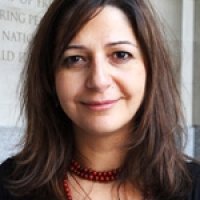Hezbollah’s Interests in Syria
Hanin Ghaddar, Managing Editor of NOW News (Lebanon) and a former public policy at the Wilson center, explained on July 25 why Hezbollah’s main interest in its involvement in Syria is not to protect Bashar Al-Assad, but rather, Iran.
The Middle East Program hosted a discussion with Ghaddar on “Hezbollah’s Interests in Syria.” Haleh Esfandiari, Middle East Program director, moderated the discussion.
Ghaddar discussed the scope and shape of Hezbollah’s involvement in Syria. She quoted Hassan Nasrallah, the secretary general of Hezbollah, on his declaration regarding the party’s mobilization in Syria, saying, “Hezbollah is there to help Iran become a resistance state.” She said this is a clear indication of Hezbollah’s commitment to Iran and the turning of Syria into an “Iranian territory.”
Ghaddar noted the Islamic Republic has a history of regional involvement through Shi’a communities, whether in Lebanon or Iraq. According to Ghaddar, Iran’s top priority is to maintain what she termed the “regional flow of power” that extends from Lebanon through Iraq. Therefore, Iran needs to ensure that it has political leverage in the post-Assad Syria. She defined Hezbollah’s shift of strategy as a means for Iran to extend its territorial influence. She clarified that Iran is not trying to defend Assad’s regime as much as it is trying to tip the regional balance of power to its side. Iran is chiefly interested in asserting its political and military presence via Hezbollah in Al-Qusayr, Homs, and throughout the Syrian coastal mountain range, where the Alawite population is mostly concentrated. Hezbollah is also maintaining a presence in Damascus and its suburbs because of the symbolic value it has as the capital.
Speaking about the situation on the ground, Ghaddar reported that different information sources confirmed the presence of 2,000 Hezbollah fighters in Aleppo alone. She estimated the total number of fighters to be 7,000-10,000 fighters in Syria. She said that in response to Hezbollah’s actions in Syria, many Sunnis are coming from neighboring areas, such as Afghanistan, Pakistan, and Chechnya, to join the rebels. Not only Sunnis, but many Shia’s from Iraq, Pakistan, and Afghanistan are going to Syria to join in the “divine battle,” turning Syria into a sectarian war zone. Ghaddar considered Al-Qusayr a determining battle for Hezbollah because it was when Hezbollah first officially declared they are involved militarily in Syria. Hezbollah fighters, she stated, were not waging a war of resistance against Israel, but they were in Syria fighting Sunnis.
Ghaddar added that these events have important repercussions on Lebanon, the wider Middle East region, and beyond. She explained that this puts the Shi’a in confrontation with all the Sunnis in the region, threatening political stability and creating many social cleavages. However, she said that many middle class and educated Shi’as in Lebanon find this holy war to be illogical. She said there are Shi’as who are losing their jobs and feeling socially isolated, and they only want to continue their everyday life.
Ghaddar voiced the concern that Shi’as in Lebanon may not have another alternative but to tolerate the consequences of Hezbollah’s strategies. She explained that Hezbollah itself, which is facing pressure from the local population in south Lebanon, does not “have a choice but to obey Iran.”
By Azd Al-Kadasi, Middle East Program
Speaker

Inaugural Friedmann Visiting Fellow, Washington Institute for Near East Policy
Hosted By

Middle East Program
The Wilson Center’s Middle East Program serves as a crucial resource for the policymaking community and beyond, providing analyses and research that helps inform US foreign policymaking, stimulates public debate, and expands knowledge about issues in the wider Middle East and North Africa (MENA) region. Read more
